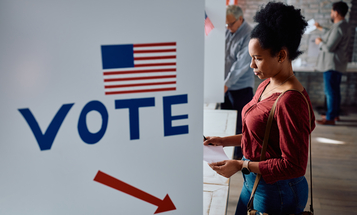
Is the Truth About Trump and Russia Slipping Through Our Fingers?
Congress’ job is to tell the American people exactly what happened in 2016, take action to prevent similar interference going forward, and hold publicly accountable anyone who acted illegally or simply counter to the public interest.
We all know that an authoritarian regime launched a major effort to interfere with the 2016 elections, and that Trump and his allies would rather go off chasing mythic illegal voting than get to the bottom of what happened.
But there are so many unanswered questions. Did anyone from the Trump campaign collude with the Russians? Did Trump obstruct justice by firing FBI Director Comey? What were Jared Kushner’s, Paul Manafort’s, and Donald Trump Jr.’s roles in all of this? What kind of murky financial ties may be driving the administration’s foreign policy agenda?
Congress’ job is to tell the American people exactly what happened in 2016, take action to prevent similar interference going forward, and hold publicly accountable anyone who acted illegally or simply counter to the public interest.
But danger signs abound that Congress may fail us.
Republicans have been talking about wrapping up their investigations by the end of 2017—not because a thorough inquiry would be complete, but rather to clear the decks for an election year.
The lead Democrat on the House Intelligence Committee took to the Washington Post a couple of weeks ago to warn that, “[t]he White House may hope it can prematurely end the congressional probes and then apply pressure to wrap up special counsel Robert S. Mueller III’s work as well.” Rep. Adam Schiff was likely sounding the alarm in part because, as Reuters reported late last week, “Republicans on the U.S. House of Representatives Intelligence Committee have coached witnesses, scheduled interviews without first requesting important documents, and many fail to attend witness interviews, four sources close to the investigation said.”
Then this week came the news that after months of inactivity, the Republican chairs of the House Judiciary and Government Oversight Committees are finally jumping into action—to investigate the Department of Justice’s handling of its 2016 Hillary Clinton investigation. This is exactly the type of politics-driven tangent that will only distract from the main questions at hand. Also this week, Mother Jones reports that the Senate Judiciary Committee’s “once bipartisan investigation into whether President Donald Trump obstructed justice or his campaign colluded with Russia has hit a partisan wall.”
So, there are clear causes for concern.
But, what’s the right way to move forward? With so much happening in secret, how do we know if congressional investigations are credible and calculated to getting us to the truth?
Thankfully, a bipartisan group of government oversight and national security experts have shown us the way. Last week, 15 experts released a set of “benchmarks” the public can use to assess any congressional investigation.
The short document provides some important detail, but essentially boils down to 4 basic questions:
- Is the scope of inquiry adequate and focused properly?
- Is the investigation truly bipartisan?
- Is transparency a guiding principle?
- Are the leaders of the investigation keeping the public informed about its progress?
It’s a great tool for public accountability, and a handy pocket guide for reporters and constituents who must ask the leaders of the various congressional investigations some tough questions.
We’re in a real danger zone here, and a key question hangs in the balance: Will the American people learn the full truth and get the accountability we deserve? Or will Trump and his allies bury Congress’ inquiries under a mound of political distractions?



